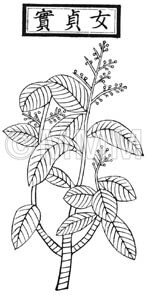Crude drug sample data base
※Click on the image to enlarge it.
The capital city, provincial capital city or the representative
location of its administrative area is indicated.
location of its administrative area is indicated.
30.592849
114.30553899999995
Production area information
People's Republic of China,Hubei Prov.
https://ethmed.toyama-wakan.net/img/pin_san.png
30.592849
114.30553899999995
Collection information
People's Republic of China,Wuhan
https://ethmed.toyama-wakan.net/img/pin_nyu.png
Scientific information data base
| Common name | 女貞子, Nuzhenzi, Ligustri Fructus (Non-JPS2022), Ligustri Lucidi Fructus (CP2020), Ligustrum Fruit (Non-JPS2022), Glossy Privet Fruit (CP2020) | |||||
|---|---|---|---|---|---|---|
| crude drug image |
| |||||
| Original plant name | Ligustrum lucidum W.T. Aiton1 or Ligustrum japonicum Thunberg2, (Tōnezumimochi1 or Nezumimochi2) | |||||
| original plant image |
| |||||
| Family name | Oleaceae | |||||
| Used part | mature fruit | |||||
| Official compendium | Non-JPS(2022), CP (2020 ed.) | |||||
| Clinical application | As a tonic applied to treat deficiency of yin with a feeling of internal heat, pain and weakness in the loins and knees, impaired vision, ringing in the ear, palpitation, insomnia, and constipation. It is an excellent medicine for the impairment of blood due to deficiency of yin. | |||||
| Medical system | Traditional Chinese medicine | |||||
| Drug effect in traditional medicine | Traditional classification | Drugs for replenishing Yin-vital essence | ||||
| Beneficial effect | [Property and Flavor] Cool; sweet and bitter. [Meridian Tropism] Liver and kidney meridians. [Actions] To nourish the liver and kidney, improve vision and blacken hairs. [Indications] Liver-kidney yin deficiency, dizziness and tinnitus, soreness and weakness in the low back and knees, premature graying, dim and blurred vision, interior heat wasting-thirst, bone-steaming and tidal fever. | |||||
| Chemical constituent | Other aliphatic and related compounds L. japonicum (*C1): Nonacosanol(種子/seed) Sugar L. japonicum (*C1): alpha-Mannite(果皮,葉/pericarp,leaf) L. lucidum (*C1): alpha-Mannite(果実/fruit) Triterpenoids L. japonicum (*C1): Oleanolic acid, Acetyl oleanolic acid(以上果皮/pericarp), Ursolic acid(葉,果皮/leaf,pericarp), Lupeol(種子/seed) L. lucidum (*C1): Oleanolic acid(果実/fruit) Sterols L. japonicum (*C1): beta-Sitosterol(種子/seed) Phenylpropanoids L. japonicum (*C1): Syringin(葉/leaf) | |||||
| Chemical structure |
※画像をクリックすると、拡大して表示されます。 | |||||
| Pharmacological effect | Not exactly known. | |||||
| Classical reference (Chinese Herbal Classic "Zhenglei bencao") |  ※Click this image to see the actual image ※Click this image to see the actual image | |||||
| Disease | Premature gray hair, Heaviness and powerlessness in lumber and knee, Lower back pain, Lightheadedness, Vertigo, Decreaced vision, Bleary eyes, Palpitation, Insomnia | |||||
| Formulation | rarely used in formula | |||||
| References | Non-JPS2022: The Japanese standards for non-Pharmacopoeial crude drugs 2022. CP2020: Pharmacopoeia of the People's Republic of China 2020 edi. C1)The Encyclopedia of Wakan-Yaku with Color Pictures Vol. I, pp 204-205. | |||||
| Remarks | "Wajoteishi" (和女貞子), produced in Japan in the past, is the mature fruit of Ligustrum japonicum Thunb. (Jap. name: Nezumimochi). It has no marketability at present. The leaves of Tōnezumimochi have medicinal benefits of antipyretic and analgesic actions. It is used externally for various injuries and cures eye problems, intrabuccal lesion,s and lumbar pain. Listed in the Japanese standards for non-Phamacopoeial crude drugs 2018 for the first time. | |||||
| Last renewal date | 2022/07/21 | |||||













